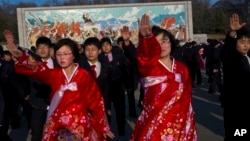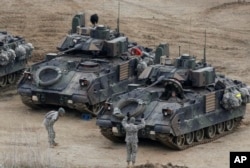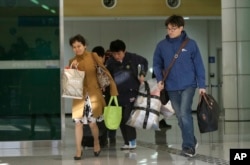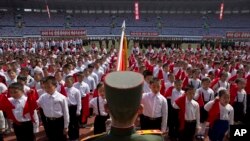Despite ever increasing tensions on the Korean peninsula, students in the North Korean capital broke out into dance Thursday.
Young people in Pyongyang wore suits and traditional dresses as they performed folk dances to celebrate the anniversary of leader Kim Jong Un's appointment to the country's top party post.
But on state-run television, news readers issued new threats of impending war, saying "our arms are ready to fire and the exact coordinates are input to the warheads. Once we push the button, it will be fired, and the strongholds of our enemies will be turned to a sea of flames.''
U.S. and South Korean forces remain on heightened alert for a possible North Korean missile test, and in London foreign minister from the Group of 8 (G8) issued a communique condemning Pyongyang's "current aggressive rhetoric."
Earlier, German Foreign Minister Guido Westerwelle said the time has come for North Korea to calm down.
"This war rhetoric is not in any way acceptable, and the G8 has a united position on this. We are all convinced that this escalation of war rhetoric needs to end," he said. "It is about level-headedness, de-escalation, and it is unacceptable that North Korea's escalation creates so much tension in this situation."
South Korea's defense ministry said Thursday it is fully prepared to deal with a North Korean launch. Spokesperson Kim Min-seok, insisted the military is ready to intercept any rocket.
"Our military is concerned a North Korean missile launch can threaten our territory and our people's safety, so we are preparing a full defensive posture," he said. "Also, we are preparing so that when North Korea launches the missile, we can immediately figure out where it is heading."
Kim said Seoul believes the launch could occur on or before the Monday birthday of North Korea's late founding leader, Kim Il Sung. The date is one of the most important on the North Korean calendar.
But the defense ministry refused to comment on a report by Japan's Kyodo news agency, which quoted an unnamed Tokyo defense official as saying a North Korean missile launcher was in a "raised position."
Despite concerns, U.S. Director of National Intelligence James Clapper told lawmakers Thursday that all of North Korea's actions appear to be a ploy for the sake of North Korean leader Kim Jong Un.
He said, "I think first and foremost it's to show that he is firmly in control in North Korea."
North Korea is believed to have moved several mid-range missiles to its east coast in preparation for tests to demonstrate its ability to strike American targets in the region.
Officials believe the missiles include the previously untested Musudan, which has a longer range and could potentially reach South Korea, Japan, or the U.S. territory of Guam.
Meanwhile, South Korea is suggesting dialogue with the North could help reduce tensions. The South's Unification Ministry Thursday called on Pyongyang to engage in talks over the closure of a joint industrial center.
North Korea this week pulled its workers from the Kaesong industrial zone, placing in doubt the future of the last remaining sign of economic cooperation between the two wartime foes. It earlier blocked South Korean access to the center.
On Thursday, Taiwan became the first country to warn against traveling to North Korea. A foreign ministry statement urged citizens to delay non-essential trips to the country because of the unpredictability of the security situation.
South Korea's central bank, however, reassured investors that the threats pose no immediate threat to Seoul's economy, which is Asia's fourth largest.
Young people in Pyongyang wore suits and traditional dresses as they performed folk dances to celebrate the anniversary of leader Kim Jong Un's appointment to the country's top party post.
But on state-run television, news readers issued new threats of impending war, saying "our arms are ready to fire and the exact coordinates are input to the warheads. Once we push the button, it will be fired, and the strongholds of our enemies will be turned to a sea of flames.''
U.S. and South Korean forces remain on heightened alert for a possible North Korean missile test, and in London foreign minister from the Group of 8 (G8) issued a communique condemning Pyongyang's "current aggressive rhetoric."
Earlier, German Foreign Minister Guido Westerwelle said the time has come for North Korea to calm down.
"This war rhetoric is not in any way acceptable, and the G8 has a united position on this. We are all convinced that this escalation of war rhetoric needs to end," he said. "It is about level-headedness, de-escalation, and it is unacceptable that North Korea's escalation creates so much tension in this situation."
South Korea's defense ministry said Thursday it is fully prepared to deal with a North Korean launch. Spokesperson Kim Min-seok, insisted the military is ready to intercept any rocket.
"Our military is concerned a North Korean missile launch can threaten our territory and our people's safety, so we are preparing a full defensive posture," he said. "Also, we are preparing so that when North Korea launches the missile, we can immediately figure out where it is heading."
Kim said Seoul believes the launch could occur on or before the Monday birthday of North Korea's late founding leader, Kim Il Sung. The date is one of the most important on the North Korean calendar.
But the defense ministry refused to comment on a report by Japan's Kyodo news agency, which quoted an unnamed Tokyo defense official as saying a North Korean missile launcher was in a "raised position."
Despite concerns, U.S. Director of National Intelligence James Clapper told lawmakers Thursday that all of North Korea's actions appear to be a ploy for the sake of North Korean leader Kim Jong Un.
He said, "I think first and foremost it's to show that he is firmly in control in North Korea."
North Korea is believed to have moved several mid-range missiles to its east coast in preparation for tests to demonstrate its ability to strike American targets in the region.
Officials believe the missiles include the previously untested Musudan, which has a longer range and could potentially reach South Korea, Japan, or the U.S. territory of Guam.
Meanwhile, South Korea is suggesting dialogue with the North could help reduce tensions. The South's Unification Ministry Thursday called on Pyongyang to engage in talks over the closure of a joint industrial center.
North Korea this week pulled its workers from the Kaesong industrial zone, placing in doubt the future of the last remaining sign of economic cooperation between the two wartime foes. It earlier blocked South Korean access to the center.
On Thursday, Taiwan became the first country to warn against traveling to North Korea. A foreign ministry statement urged citizens to delay non-essential trips to the country because of the unpredictability of the security situation.
South Korea's central bank, however, reassured investors that the threats pose no immediate threat to Seoul's economy, which is Asia's fourth largest.








